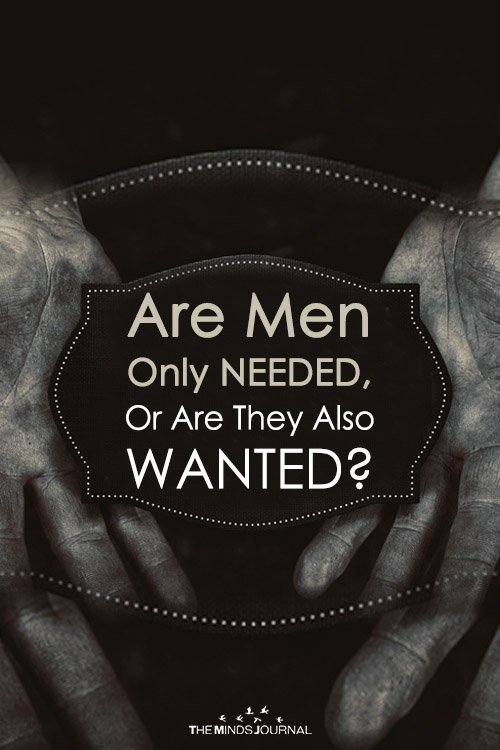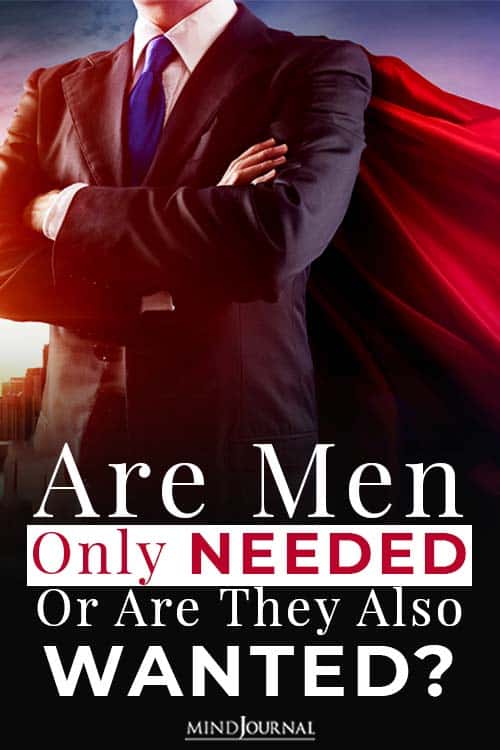Men also like to be wanted, just like they are needed. They have feelings and sentiments too, and they also crave tenderness and care just like women do.
Running an online magazine about masculinity, I’ve come to observe a curious phenomenon. When we post about male rape victims or the enforcement of masculine gender roles, we get plenty of interesting comments.
But when we post about Nice Guy Syndrome and other issues around men who feel sexually unwanted, our comments blow up like they were directed by Michael Bay. This is an issue that touches men deeply and damagingly, and ties in with a lot of pain that, hegemonic masculinity being what it is, usually doesn’t get talked about.
Others, such as Hugo Schwyzer, have written about how straight men don’t feel sexually desired, but that’s the tip of the iceberg. It’s hard to overestimate just how deep this idea goes. It feeds into a phenomenon a lot of guys have experienced, a phenomenon based on weird broken ideas about gender roles, ideas so deeply rooted in the subconscious that most men aren’t even aware that they’ve got them.
The core issue is this: many, many men in our society feel they have to be needed, because they can’t imagine they could ever be wanted.
Being needed can take different forms, all of which resemble traditional male roles.
- Brave protector against danger.
- Bread-winning economic provider.
- Indispensable handyman.
- Problem-solving leader.
We get any more macho stereotypes in here, it’s gonna look like a Village People reunion. This is what being masculine means in our culture: to be necessary.
Related: The Only Quality That Matters In A Man
One of the most common complaints about feminism, all the way back to the First Wave, is that feminism seeks to make men obsolete or unnecessary. “If women can [fill in anything about female agency] what will they need men for?” runs the line, in every decade, in response to every advance. And while nobody is arguing that that’s a legitimate criticism, it’s important to understand that it arises out of real fear. Look at the keyword in that sentence, need. It’s always the same concept, however, that objection is phrased.
Plan A, for men in our society, is to be necessary, to be needed, to be indispensable. There is no plan B.
If plan A doesn’t come off, we are lost, we’re adrift, we have nothing. This is an existential fear, on a very deep level.
There’s a common observation among those who, like myself, have worked in senior citizen care homes. It’s related to why the population of those homes skews heavily female, to why men die younger than women. Over and over, again and again, those who are around senior citizens have to deal with retired men who, no longer working and no longer earning money, don’t know why they’re still alive.
They don’t know who they are or why they bother to continue drawing breath if they’re no longer needed for something important. Some of them find something else to define themselves, some new project or internal source of worth. Others just give up and let the next swell of ill health carry them overboard.
The “crisis of masculinity” that many people are currently wringing their hands over, the “mancession” involving men’s employment dropping slightly faster than women’s, the cultural yearning for an imagined past when men bestrode the world like gray-suited colossi, building and making and innovating important things, the same problem.
We’re at a place, culturally and economically, where many of the traditional sources of necessity for men have evaporated, or at least been drastically downsized.
We don’t need to have 25% of the population growing food any more; we can do it with 2%.
Women don’t need men to provide for them any more, education and career opportunities have opened up. All this would be fine, if there were any plan B.
It’s a well-worn observation that media is the first place to look for enforcement of societal norms. A quick glance at our culture’s media demonstrates that it endlessly reinforces the notion of male necessity. On a surface level, there’s the fact that with fictional heroes remaining overwhelmingly white males, if a guy doesn’t show up, there’s no story at all. That’s a nice form of necessity. Deeper than that, though, there’s the structure of every “romantic” subplot in every movie that has a character who can be accurately described as The Girl.
Every action movie, every sci-fi epic, all the movies that are stereotypically written off as male power fantasies, all have the same way that the hero gets the girl: he proves his necessity, usually by saving her life. If he weren’t there, she’d literally be dead.
Interestingly, the romantic movies often stereotyped as female fantasies do not generally have this dynamic. Oddly, however, even those rarely focus on the male lead as the object of desire; the female gaze is commonly absent from these stories. Instead, the heroine tends to be the object, and the hero prevails by demonstrating that his desire for her is the biggest and most special and pure and so on. Not even in the realm of “chick flicks” about the joys of heterosexual pair-bonding are men seen as desired, as wanted.
I’m not speaking in the abstract here; when this wanted/needed dichotomy was first pointed out to me, I felt a deep and embarrassing pang of recognition. I myself like it when I can rescue my girlfriends when I can save the day or handle the problem or otherwise demonstrate my irrefutable necessity. I like feeling needed because even for me, even with all my ever-so-educated awareness of gender roles and stereotypes, even with all the women who’ve told me I’m sexy and desirable, I still can’t quite convince myself that I’m wanted. Even if I am, being wanted can only be a nebulous and fleeting state. Being needed, now, that’s solid. That’s a reason to keep going.
Related: 28 Fun Questions to Ask a Guy That He’ll Love
It is downright incredible how resistant to empirical data the sense of being unwantable is.
It took many years and girlfriends before I began to suspect that every woman who slept with me might not be humoring me out of pity. Even then, and to this day, I feel more secure in relationships when I can provide a measurable and necessary form of value other than just my own charms, whatever those might be. Girlfriend needs a ride to the airport? I’m on it! Needs a ride to the hospital? Even better!
The rare occasions where I can help out with covering bills when she’s short on rent (most of the women I’ve loved make more money than a starving writer, it turns out) are even better, because I am Providing For My Woman, and I feel the warm glow of centuries of hegemonic masculinity validating me.
Let me be clear: I know this is stupid. I know it’s asinine social programming and that these women consider me sexually and emotionally desirable. But there’s a difference between knowing that and believing it. And for guys who haven’t got a girlfriend, who feel the bitter sting of active rejection or the endless cold of passive rejection, who yearn for love and sex and the touch of another hand… what can they possibly believe about being wanted?
The fact is, as I’ve learned during prolonged periods of loneliness myself, when a lifetime of “Ewwww, gross, naked guy!” jokes combine with stretches of personal rejection, it’s easy to feel neither wanted nor needed.
Maybe you’re lucky enough to have a job where your particular abilities are necessary, so that’s a form of being needed, one you can throw yourself into, but it’s not the same as being needed by another person. Being wanted by another person, at that point, has disappeared over the horizon, into an unmarked area of the map labeled ‘HERE BE UNICORNS THAT DISPENSE FREE MONEY.’
It’s easy to get bitter when you feel unwanted, and so this unfortunate confluence of forces has left our culture littered with embittered men who get very upset about what they can’t help but perceive as their own failure.
Related: A Male Brain V/s A Female Brain: 13 Interesting Differences
It’s easy to dismiss them as angry losers or some other convenient pejorative, but I’ve walked a few too many miles in their shoes to call their pain baseless. I don’t pretend to have a solution, but the least we can do is begin to correctly identify the problem.
Written by Noah Brand Originally appeared on The GoodmenProject.com










Leave a Reply
You must be logged in to post a comment.